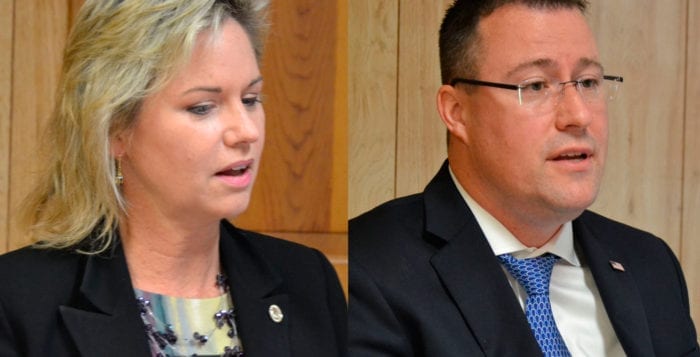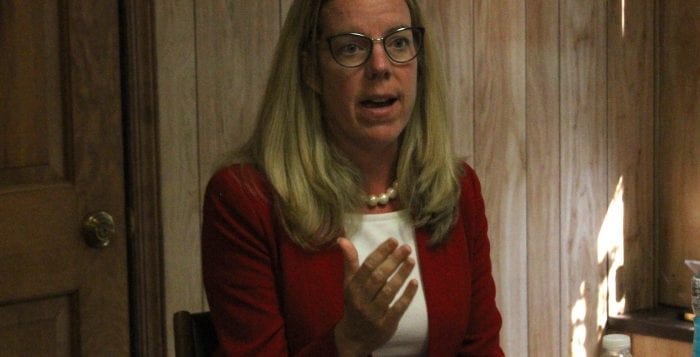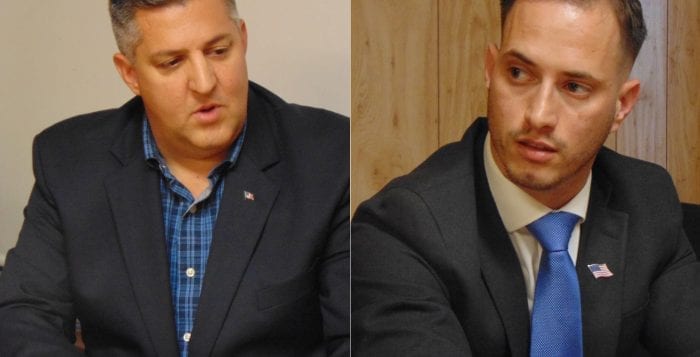Five-term Suffolk County Legislator Sarah Anker (D-Mount Sinai) is once again facing Republican challenger Gary Pollakusky, a Rocky Point business owner and head of the recently remodeled Rocky Point Sound Beach Chamber of Commerce. The candidates challenged each other in 2017, but while many issues remain the same, such as county finances, coastal water issues and opioids, the campaign season has been even more contentious than two years before.
Many of the Republicans running for county Legislature this year have made county finances a major part of their campaigns, and Pollakusky made it a point when he ran two years ago.
“The $4 billion plan is unrealistic — it will come down to taxpayers, people who are leaving the Island, to take on this burden.”
— Gary Pollakusky
In a recent in-house debate at TBR News Media offices, the Republican challenger pointed to the recent report from the New York State comptroller, Thomas DiNapoli (D), which called Suffolk one of the most fiscally stressed counties in the state, Pollakusky adding the county now has junk bond status. He said small businesses have a hard time opening in Suffolk County, that it takes two to three years when it should, at most, two to three months. He said the county should have done more to bring in retail giant Amazon.
Though the largest percentage of residents’ tax bills are due to school districts, the challenger said Suffolk should look to work with both the state and local school districts to reduce the number of administrators, even creating a “chancellor of education” to oversee that cause.
Anker, who first came to the Legislature in 2011 during a special election, argued that the county is not in as much fiscal stress as Republicans have said. She argued that the county’s Baa2 bond rating by Moody’s shows a different picture of the county’s financial shape. She said finances have improved significantly since when she was first elected.
The incumbent argued that instead of looking to bring in Amazon, the North Shore should look to become an “ecotourism hub,” with amenities like the new North Shore Rail Trail and Tesla Science Center.
“Instead of making a right to go pumpkin picking and wine tasting, take a left to downtown Rocky Point, so we can revitalize it,” she said. “So many stores have gone out recently.”
The Republican challenger criticized Anker for removing Rocky Point from the county sewer list and called Suffolk’s prototype septic system program a “toilet tax.” Though residents can get grants from New York State that pay most or all of the installation, Pollakusky argued there are fees attributed to landscaping or regular maintenance.
“As far as runoff, the $4 billion plan is unrealistic — it will come down to taxpayers, people who are leaving the Island, to take on this burden,” he said.
Anker called Suffolk the “most proactive agencies in government that addresses this issue,” adding she supports the prototype septic systems as well as the county water authority’s multibillion dollar plans to reduce 1,4-dioxane in wells throughout the county.
She added the reason she removed Rocky Point from the sewer list came from a request by the Rocky Point Civic Association whose members said they did not want to pay an additional sewer tax.
Anker currently chairs the Suffolk County Heroin and Opiate Epidemic Advisory Panel, which was created in 2017. She said the panel has already borne fruit with one recent example being Suffolk County police’s new mass spectrometer, which can identify previously undetectable substances. She said the device came from a suggestion on the 24-member panel. She added the county’s lawsuit of pharmaceutical company Purdue and the Sackler family may bring in millions of dollars of revenue to the county.
“Instead of making a right to go pumpkin picking and wine tasting, take a left to downtown Rocky Point, so we can revitalize it.”
— Sarah Anker
Pollakusky argued that while some county statistics say the opioid epidemic has plateaued, he hasn’t seen an example of that in the district, claiming there is a glut of “drug dealing homes” all across the North Shore. Like in 2017, he criticized his opponent for voting to close the Foley Center in Yaphank, saying it could have been used for bed space and as a treatment center.
Anker came back saying the county should look toward public-private partnerships in creating new treatment space.
Though the candidates talked about the ongoing issues, they were also asked how they felt about their opponents campaign tactics during this contentious season. The challenger’s voice rose during the debate as he criticized Anker for mailings published by political advocacy group People for Political Responsibility, depicting him in photoshopped, unflattering images. He claimed Anker had been disbursing campaign material at functions like the Downtown Rocky Point Summer Concert Series and advocating for herself over radio.
Anker fired back that she had nothing to do with the mailings and had not handed out campaign material at these functions, instead handing out informational pamphlets for services provided by the county. She said her radio show was not sponsored at all by her campaign and only talked of work being done in the Legislature.
Both have continuously blamed the other for politicizing an incident several months ago at the final summer concert series event, when chamber members were barred from entering the concert. Chamber members said they had permission from the local Veterans of Foreign War post, which participates in putting on the concerts, but Anker said she had only received word that they wanted to attend the day before, and that they did not have space for them. The chamber was allowed a single table at the concert, she added. Pollakusky said it was unfair she was able to attend and “campaign” at the concert while disallowing others.
This post has been amended from how it appeared in the Village Beacon Record to clarify Anker’s position on informational material for services provided by the county.































